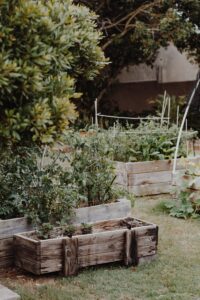Imagine stepping out into your backyard, surrounded by vibrant flowers, lush greenery, and the melodious chirping of birds. The familiar scent of freshly turned soil fills the air as you delve into the art of gardening. In this article, we explore the captivating world of gardening, a beloved pastime that beautifies our surroundings and nurtures our souls. Discover the peace and serenity that can be found amidst nature’s bountiful offerings, and embark on a journey of personal growth and tranquility through the joy of gardening. Gardening is a hobby and an activity that brings numerous health benefits. In this comprehensive article, we will explore the physical and mental health benefits of gardening and its ability to improve overall well-being. We will also explore how gardening allows us to connect with nature and create beautiful spaces. Furthermore, we will discuss how it serves as a stress reliever, promotes physical activity and exercise, offers educational opportunities, fosters community, has therapeutic effects, and helps preserve the environment. So, grab your gardening tools, and let’s dive into the beautiful gardening world!
Health Benefits of Gardening
Physical Benefits
Engaging in gardening activities offers a multitude of physical benefits. Working in the garden, we engage in various physical movements such as digging, bending, lifting, and carrying. These activities help improve our strength, endurance, and flexibility. Gardening can even be considered a low-impact exercise, allowing us to burn calories and maintain a healthy weight. Furthermore, exposure to sunlight during gardening contributes to the synthesis of Vitamin D in our bodies, which is essential for bone health.
Mental Health Benefits
Gardening has been proven to have a positive impact on our mental well-being. Nurturing plants and watching them grow can be incredibly satisfying and rewarding. It gives us a sense of purpose and achievement, which helps boost our self-esteem and confidence. Moreover, the presence of greenery and vibrant colors in the garden has a calming effect on our minds and helps reduce stress and anxiety. Gardening also provides a welcome distraction from the daily pressures of life, allowing us to focus on the present moment and find inner peace.
Improving Overall Well-being
Engaging in gardening activities promotes a holistic sense of well-being. It allows us to connect with nature and the natural rhythms of life. Gardening provides a sense of responsibility and encourages us to care for and nurture living things. This connection with nature helps us feel grounded and in tune with the world. Additionally, abundant fresh air and exposure to nature’s beauty while gardening can significantly improve our mood and happiness.
Connecting with Nature
Building a Connection
Gardening provides a unique opportunity to build a deep connection with nature. As we spend time in the garden, we become more aware of life’s natural cycles and rhythms. We witness the growth and transformation of plants, experience the changing seasons, and observe the intricate interplay between different species. This connection with nature fosters a sense of awe and appreciation for the wonders of the natural world.
Creating a Sanctuary
The garden can often serve as a sanctuary, a place where we can escape the stresses of daily life and find solace. It offers a peaceful and tranquil environment, far removed from the noise and distractions of urban living. The sounds of birds chirping, the gentle rustling of leaves, and the scent of flowers in bloom create a soothing atmosphere that promotes relaxation and rejuvenation. By creating a sanctuary in our garden, we can find refuge from the demands of modern living and reconnect with our inner selves.
Observing Life Cycles
In the garden, we have the unique opportunity to witness the intricacies of life cycles. From planting seeds and nurturing seedlings to seeing the blossoming of flowers, the garden provides a front-row seat to the marvels of life. We observe the transformation of a tiny seed into a full-grown plant, and we witness the delicate dance of pollination and the emergence of new life. This observation of life cycles enhances our understanding of nature and reminds us of the cyclical nature of our own lives. It teaches us patience, resilience, and the beauty of growth and renewal.
Gardening as a Stress Reliever
Enjoying Solitude
Sometimes, we all need some time alone to recharge and reflect. Gardening provides the perfect opportunity for solitude and personal reflection. Spending time alone in the garden allows us to disconnect from the outside world’s noise and focus on our thoughts and feelings. As we tend to our plants, we can meditate, practice mindfulness, or allow our minds to wander freely. This solitude in the garden offers a sense of peace and tranquility that is hard to find elsewhere.
Grounding and Mindfulness
Gardening encourages us to be fully present and pay attention to the task. These activities require focus and attention, whether carefully pruning a plant or pulling weeds from the soil. Being present in the garden promotes mindfulness, allowing us to ground ourselves in the present moment and let go of worries and anxieties. The act of digging our hands into the earth, feeling the texture of the soil, and smelling the fresh scent of nature can be incredibly grounding and grounding and grounding and grounding and grounding.
Easing Anxiety
The tranquility of the garden and the calming effects of being surrounded by nature can help alleviate anxiety. Gardening allows us to escape the stressors of daily life and find solace in the natural world. The repetitive tasks involved in gardening, such as watering, weeding, and planting, can be meditative and provide a sense of purpose. The rhythmic movements and the focus required during these tasks help calm our minds and reduce feelings of anxiety. Additionally, the physical activity in gardening releases endorphins, which are natural mood-lifters that can help alleviate stress.
Growing Your Food
Fresh and Nutritious Produce
One of the most satisfying aspects of gardening is growing our food. The fruits and vegetables we harvest from our garden are incredibly fresh and packed with nutrients. By growing our produce, we have complete control over the growing process, ensuring no harmful chemicals or pesticides are used. This allows us to enjoy higher-quality food free from harmful additives and preservatives. Furthermore, growing our food encourages us to eat a more varied and healthy diet, as we are more inclined to consume the fruits and vegetables we have personally nurtured.
Gardening for Sustainability
In a world where environmental sustainability is of utmost importance, gardening offers an opportunity to reduce our carbon footprint and promote sustainable practices. Growing our food minimizes the demand for commercially produced fruits and vegetables, which often require long-distance transportation and contribute to greenhouse gas emissions. By gardening organically and avoiding harmful chemicals, we contribute to a healthier environment and protect the delicate balance of ecosystems. Embracing sustainable gardening practices not only benefits us but also plays a role in preserving the planet for future generations.
Sense of Accomplishment
Growing our food provides a profound sense of accomplishment. Tending to the garden, planting the seeds, nurturing the plants, and eventually harvesting the produce is a labor of love that spans several weeks or months. When we finally enjoy the fruits of our labor, we feel immense pride and satisfaction. Growing our food reminds us of our connection to the earth and the cycle of life. It highlights our ability to be self-sufficient and reminds us of the simple pleasures of reaping what we sow.
Creating Beautiful Spaces
Enhancing Aesthetics
One of the most visible and rewarding outcomes of gardening is the ability to create aesthetically pleasing spaces. We can transform a patch of land into a stunning garden by carefully selecting and arranging plants, flowers, and shrubs. The vibrant colors, pleasing textures, and delightful scents in a well-designed garden are a feast for the senses. A garden’s beauty can uplift our spirits, brighten our surroundings, and create a welcoming atmosphere for ourselves and others.
Attracting Wildlife
Gardens are not only beautiful but also serve as havens for a variety of wildlife. We can attract birds, butterflies, bees, and other creatures by creating a garden that offers food, water, and shelter. Our gardens become miniature ecosystems, buzzing with life and activity. The sight of butterflies flitting from flower to flower or birds singing melodious tunes adds an extra dimension of joy to the garden. It reminds us of the interconnectedness of all living things and the importance of biodiversity.
Creating a Place of Solace
A well-tended garden can become a sanctuary where we can escape the hustle and bustle of everyday life and find peace. We can create spaces that invite relaxation and contemplation by carefully designing our garden spaces and incorporating elements such as seating areas, pergolas, or water features. These tranquil corners provide an oasis of calm in our busy lives, allowing us to unwind and recharge. Whether we read a book, practice yoga, or sit in quiet reflection, our gardens become intimate spaces that nourish our souls.
Educational Opportunities
Learning about Plants and Ecosystems
Gardening is an excellent opportunity for lifelong learning. As we tend to our plants, we develop a deeper understanding of their growth requirements, life cycles, and interactions with their environment. We learn about the different types of plants, the intricacies of soil composition, and the importance of sunlight and water. Gardening encourages us to become lifelong learners, continually seeking new knowledge and experimenting with different planting techniques. Through our hands-on experiences in the garden, we become intimate observers of nature and gain insights into the delicate balance of ecosystems.
Teaching Children about Nature
Gardening provides a beautiful platform for teaching children about nature and instilling a love for the natural world. By involving children in gardening activities, we expose them to the wonders of the environment and help them develop a sense of responsibility for the earth. Children can learn about the life cycles of plants, the importance of pollinators, and the impact of human activities on the environment. Gardening also offers opportunities for children to learn about healthy eating habits and sustainability as they witness growing their food. Engaging children in gardening nurtures their curiosity, fosters creativity, and teaches valuable life skills.
Experimenting with Different Gardening Techniques
Gardening is a never-ending journey of discovery and experimentation. There are countless techniques and approaches to explore, from container gardening to raised beds, companion planting, and organic gardening. Each method offers its own set of advantages and challenges. By trying different approaches in the garden, we broaden our knowledge base and develop a sense of adaptability. The garden becomes a living laboratory where we can test new ideas, learn from our successes and failures, and constantly refine our gardening practices. This spirit of experimentation keeps gardening exciting and allows us to evolve as gardeners.
Physical Activity and Exercise
Engaging in Low-Impact Exercise
Gardening provides a unique form of physical activity that is gentle on the body yet highly effective in keeping us active. The various tasks involved in gardening, such as digging, planting, and weeding, require a range of movements that engage multiple muscle groups. These activities provide a low-impact form of exercise that does not strain our joints and muscles excessively. Regular gardening can help improve cardiovascular health, strengthen bones and muscles, and enhance overall fitness.
Improving Flexibility and Strength
The physical movements in gardening, such as bending, stretching, and reaching, promote flexibility and improve joint mobility. These actions help to keep our muscles and joints supple, reducing the risk of stiffness and injury. Furthermore, the repetitive nature of gardening tasks can help build strength in our muscles, particularly in the upper body and core. The lifting, carrying, and digging in gardening requires us to engage our muscles, resulting in improved strength and endurance over time.
Increasing Energy Levels
Engaging in physical activity, such as gardening, stimulates the production of endorphins, natural chemicals in our bodies that elevate mood and boost energy levels. The fresh air, sunshine, and gentle movements associated with gardening can invigorate both our bodies and minds. Regular gardening sessions can provide a natural energy boost and help alleviate feelings of fatigue and lethargy. It’s like a rejuvenating tonic that leaves us feeling refreshed and revitalized.
Gardening for Community
Collaborative Gardening Projects
Gardening can bring people together and foster a sense of community. Collaborative gardening projects, such as community gardens or allotments, allow individuals to come together to cultivate shared spaces. These projects encourage cooperation, teamwork, and a sense of collective ownership. Participants can share resources, knowledge, and experiences, creating a supportive and inclusive community. Collaborative gardening projects promote interaction and create opportunities for social connections, helping to combat feelings of isolation and loneliness.
Sharing and Exchanging Plants
Gardening offers a unique opportunity for plant lovers to share their passion with others. Whether it’s through plant swaps, giving away cuttings, or participating in seed exchanges, gardening allows us to share the joy of growing with fellow enthusiasts. Sharing plants will enable us to diversify our gardens, encourage biodiversity, and promote sustainable gardening practices. Giving and receiving plants creates a sense of connection and camaraderie among gardeners, fostering a spirit of generosity and friendship.
Fostering a Sense of Belonging
Being part of a gardening community provides a sense of belonging and purpose. It offers an opportunity to connect with like-minded individuals who share a love for plants, nature, and the environment. By participating in gardening clubs, attending workshops, or volunteering in local gardens, we become part of a more extensive network of individuals united by a common interest. This shared sense of purpose and belonging creates a supportive and nurturing environment where we can learn from each other, exchange ideas, and celebrate our mutual successes.
Therapeutic Effects of Gardening
Horticultural Therapy
Horticultural therapy is a specialized form of therapy that utilizes gardening activities to improve physical and mental well-being. It is effective in treating a wide range of conditions, including depression, anxiety, and dementia. Gardening can promote relaxation, reduce stress, and serve as a creative expression. Horticultural therapy programs often include activities such as seed planting, garden design, and nature-based crafts, which provide individuals with a sense of purpose and achievement. The therapeutic effects of gardening are rooted in the ability of nature to heal and nurture our minds and bodies.
Gardening for Rehabilitation
Gardening can play a significant role in rehabilitating individuals recovering from physical injuries or illnesses. The physical movements involved in gardening, such as digging, planting, and weeding, can help rebuild strength, improve coordination, and enhance overall bodily functioning. Additionally, the sensory experience of being in nature and the act of nurturing plants can have a positive impact on mental well-being during the recovery process. Gardening gives individuals a sense of empowerment and control over their environment, which can significantly contribute to their rehabilitation.
Sense of Purpose and Achievement
Gardening provides a sense of purpose and achievement that is deeply satisfying. By nurturing plants and watching them flourish, we experience a sense of responsibility and connection to the natural world. Tending to the garden, overcoming challenges, and witnessing the rewards of our efforts instill a sense of accomplishment. Gardening teaches us patience, resilience, and adaptability. It reminds us that growth takes time and that we can achieve beautiful and bountiful results with care and perseverance.
Preserving the Environment
Conserving Water
In an era of increasing water scarcity, gardening offers an opportunity to conserve water actively. We can reduce water wastage and promote sustainability by employing water-wise gardening techniques such as mulching, drip irrigation, and careful watering practices. Choosing drought-tolerant plants and native species also helps minimize garden water usage. By being mindful of our water consumption in the garden, we contribute to conserving this precious resource.
Promoting Biodiversity
Gardening provides a platform to promote biodiversity and protect our planet’s delicate ecosystems. By incorporating a variety of flowering plants, shrubs, and trees into our gardens, we create habitats that attract pollinators, such as bees and butterflies. These pollinators play a crucial role in the reproduction of plants and the maintenance of healthy ecosystems. Additionally, including native species in our gardens helps preserve local biodiversity and supports the survival of indigenous plants and wildlife. By gardening to promote biodiversity, we become stewards of the earth and contribute to a more excellent ecological balance.
Reducing Carbon Footprint
Gardening offers a valuable opportunity to reduce our carbon footprint. By growing our food, we reduce the demand for commercially produced food that often requires long-distance transportation and contributes to greenhouse gas emissions. By embracing organic gardening practices, such as composting and avoiding synthetic fertilizers and pesticides, we minimize the release of harmful chemicals into the environment. Small changes in our gardening habits, such as collecting rainwater for irrigation or using sustainable gardening materials, can significantly reduce our carbon footprint and promote a greener planet.
In conclusion, gardening is a genuinely transformative and enriching activity that brings us closer to nature and offers multiple health benefits. From the physical benefits of low-impact exercise and increased flexibility to the mental health benefits of stress relief and mindfulness, gardening can enhance our overall well-being. It allows us to create beautiful spaces, learn about plants and ecosystems, engage in therapeutic activities, and contribute to preserving the environment. So, whether you have a small balcony or a spacious backyard, why not embark on a gardening journey? Discover the joy of gardening and find peace in nature!



